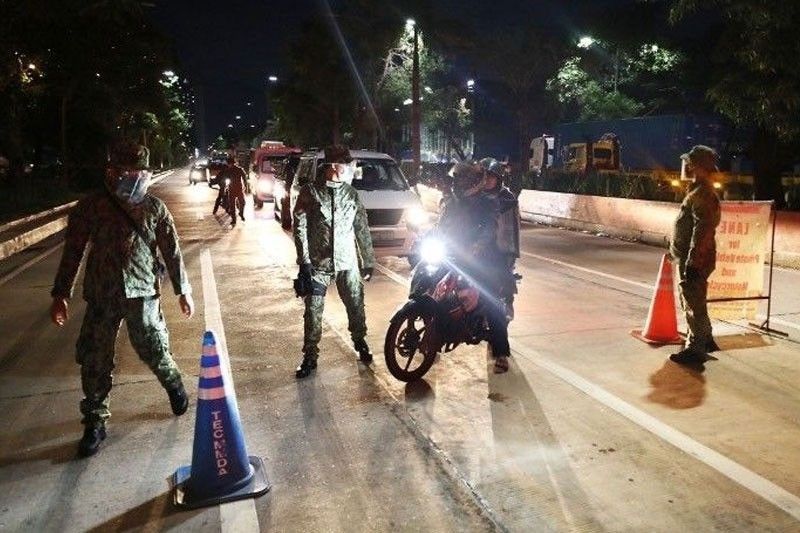Palace rules out ECQ extension, eyes MECQ

MANILA, Philippines — Another extension of the lockdown or enhanced community quarantine (ECQ) in the National Capital Region (NCR) and nearby provinces may not be possible, as the government no longer has funds to help people affected by movement restrictions, Malacañang said yesterday.
“I don’t think ECQ for a third week is actually a possibility. In fact, based on the model of the DOH (Department of Health), what they recommended was two weeks of ECQ including last week and then we had earlier another week of bubble to be followed by a week of MECQ (modified ECQ),” presidential spokesman Harry Roque said.
But an upgrade to MECQ would depend on the outcome of intensified prevention, detection, isolation, treatment and reintegration (PDITR) efforts, he added.
Metro Manila, Bulacan, Cavite, Laguna and Rizal – now collectively known as the NCR Plus bubble – have been under the strictest enhanced community quarantine (ECQ) since March 29 as COVID-19 infections continue to soar.
The lockdown was supposed to end last Sunday but the government extended it for another week as experts cited the need to ensure the sustained reduction in the number of cases.
The Duterte administration has allocated P23 billion to assist workers affected by the lockdown but officials admit the amount is not enough.
“Given what (Budget) Secretary (Wendel) Avisado said that we have no more funds for ayuda (aid) and Congress currently is on recess, so in case we need a supplemental budget, we would have to request for a special session,” Roque told ANC.
Only selected businesses remain open under MECQ, slightly more relaxed than the strictest ECQ where only essential sectors are allowed to operate.
“If we, in fact, implement the minimum health protocols and we intensify our prevention, detection, isolation, tracing initiatives, we expect the numbers to go down by around 4,000 a day by May 15. So that’s the model that we are pursuing – two weeks of ECQ and another week of MECQ,” Roque said.
He said the assistance to be given to people affected by the lockdown would only cover the “bare essentials.”
“We can only shift to the lower MECQ if we see that the intensified PDITR yielded positive results,” Roque said.
“As Secretary Avisado said, even if we wanted to give more, this is a one-time aid of P4,000 for a family of four. So it is an aid; we acknowledge that it is not enough, but it is to provide for the bare essentials of life for two weeks, and the number of days when our countrymen were not able to work is about seven days,” he explained.
Interventions needed
Sen. Bong Go, for his part, issued a strong appeal to the government to implement urgent interventions to protect the welfare of poor and vulnerable sectors.
Specifically, Go asked the Departments of Budget and Management (DBM) and of Social Welfare and Development (DSWD) to expedite the distribution of aid to the poor.
“Around 22.9 million poor individuals making up 80 percent of the population in NCR and in the provinces of Rizal, Bulacan, Cavite and Laguna are under ECQ and they need assistance as soon as possible,” Go said.
The senator urged implementing agencies to fast-track the distribution of aid, with the help of local government units (LGUs), to ensure that those who need support the most are able to receive government assistance immediately.
“This has been approved by the President, and so we have to rush the distribution of ayuda. With the help of LGUs, assistance should now be distributed among qualified individuals in a manner that is fast and untainted by politics and corruption,” he said, adding the DMB chief had assured him that there will be no delay in delivery of assistance.
The DSWD said the distribution of assistance is expected to start today or tomorrow.
Irene Dumlao, DSWD spokesperson and officer-in-charge of the department’s Social Marketing Service, explained at a briefing that the downloading of funds for the emergency subsidy program (ESP) by the Bureau of Treasury to LGUs was done only yesterday.
She said a Joint Memorandum Circular (JMC) signed by the DSWD with the Department of the Interior and Local Government empowers the LGUs to decide on how and in what form to distribute the assistance.
Meanwhile, Health Undersecretary Rosario Vergeire said the health care utilization rate should be down to at least 60 percent before it can be considered at safe level.
“So currently, for the overall utilization here in NCR, we have about 78 to 80 percent utilization; and for ICU (intensive care unit) beds, as I have shown you a while ago, almost 100 percent in most cities. So we need to bring that down so that we will be able to say that our health care system can manage,” Vergeire said.
“Aside from that, we have our local government or CODE indicators, these are the PDITR indicators. So we have set targets per week wherein we need to see all contacts traced within 24 hours and they are isolated within 24 hours; also, looking at the percentage of those mild and asymptomatic being treated in quarantine facilities, and only those moderate to severe cases in hospitals,” she added.
Vergeire said the health system “should be able to manage and should be able to breathe and should have this decongestion” before community restrictions can be lifted.
World Health Organization representative in the Philippines Rabindra Abeyasinghe said the surge in infections is being experienced worldwide, not just in the Philippines. He said the factors that cause the surge include the new and more transmissible variants, the gradual reduction in compliance with minimum public health standards and the optimism on rollout of vaccines.
“So all of these measures have contributed in varying degrees in different countries to the increase of cases we are seeing. I would want to reiterate the fact that the Philippines is not unique in seeing an increase, and this increase is not attributed in any way to a lack or incompetence,” Abeyasinghe said. – Rainier Allan Ronda
Related video:
- Latest
- Trending






























